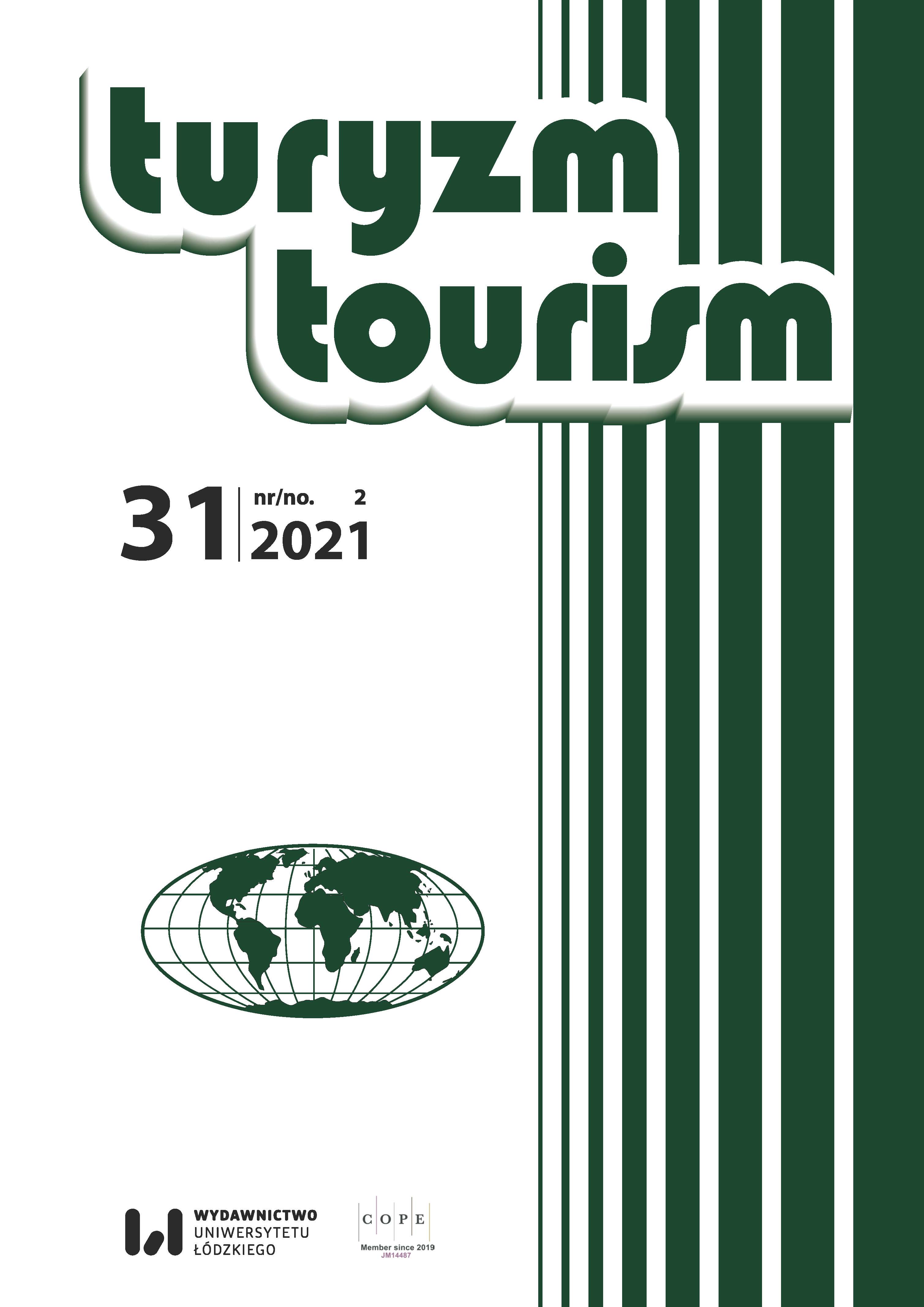The impact of Central Asian tourists’ risk perception on their travel intentions during the COVID-19 pandemic
DOI:
https://doi.org/10.18778/0867-5856.31.2.08Keywords:
pandemic, tourism, Central Asia, risk perception, travel attitude, exploratory studyAbstract
Central Asian (CA) countries (Kazakhstan, Kyrgyzstan, Turkmenistan, Tajikistan, Uzbekistan) are assumed to be one of the most attractive tourist destinations since this particular geographical location holds immense potential in tourism products. Due to the COVID-19 pandemic, the flourishing tourism sector of these countries has been immensely affected. The aim of this study is to examine the impact of Central Asian tourists' risk attitudes toward traveling during the COVID-19 pandemic through consideration of sociodemographic characteristics. The research was conducted during January through April 2021 based on a sample of 966 respondents via an online questionnaire. In the survey, risks are divided into four main categories: health, psychological, financial and travel destination. Nominal regression was used to identify the way in which risk perception affected travel intentions during COVID-19 and the research findings indicate that Central Asian tourists’ risk perception has done so. Hygiene, disinfection and a reliable health system in destinations (21%) will be leading factors in future travel.
Downloads
References
Abiad, A., Platitas, R., Pagaduan, J., Jabagat, Ch.R., Laviña, E. (2020). The Impact of Covid-19 on developing Asia: The pandemic extends into 2021. ADB Briefs, 159. https://doi.org/10.22617/BRF200367-2
Google Scholar
Aliyeva, S., Xi, C., Degang, Y., Samarkhanov, K., Mazbayev, O., Aday, S., Issanova, G., Kozhokulov, S. (2019). The socioeconomic impact of tourism in East Kazakhstan region: Assessment approach. Sustainability, 11 (17), 4805. https://doi.org/10.3390/su11174805
Google Scholar
Bekjanov, D. (2020). Assessment of the impact of COVID-19 pandemic on the tourism industry of Uzbekistan. Finance and Banking, 2, 225–237.
Google Scholar
Bekjanov, D., Matyusupov, B. (2020). Influence of innovative processes in the competitiveness of tourist destination. In: J.R.R. Soares (ed.), Innovation and entrepreneurial opportunities in community tourism (pp. 243–263). Hershey, PA: IGI Global. https://doi.org/10.4018/978-1-7998-4855-4
Google Scholar
Bratić, M., Radivojević, A., Stojiljković, N., Simović, O., Juvan, E., Lesjak, M., Podovšovnik, E. (2021). Should i stay or should i go? Tourists’ COVID-19 risk perception and vacation behavior shift. Sustainability, 13 (6), 3573. https://doi.org/10.3390/su13063573
Google Scholar
Cartwright, R. (2000). Reducing the health risks associated with travel. Tourism Economics, 6 (2), 159–167. http://dx.doi.org/10.5367/000000000101297550
Google Scholar
Chien, P.M., Ritchie, B.W., (2018). Understanding intergroup conflicts in tourism. Annals of Tourism Research, 72(C), 177–179. https://doi.org/10.1016/j.annals.2018.03.004
Google Scholar
Cró, S., Martins, A.M. (2017). Structural breaks in international tourism demand: Are they caused by crises or disasters? Tourism Management, 63, 3–9. https://doi.org/10.1016/j.tourman.2017.05.009
Google Scholar
Foo, L.P., Chin, M.Y., Tan, K.L., Phuah, K.T. (2020). The impact of COVID-19 on tourism industry in Malaysia. Current Issues in Tourism, 24 (19), 1735–2739. https://doi.org/10.1080/13683500.2020.1777951
Google Scholar
Glaesser, D. (2003). Crisis Management in the Tourism Industry. London: Routledge. https://doi.org/10.4324/9780080454801
Google Scholar
Helbe, M., Fink, A. (2020). Reviving tourism amid the COVID-19 pandemic. ADB Briefs, 150. http://dx.doi.org/10.22617/BRF200245-2
Google Scholar
Horák, S. (2014). Visa regimes and regulatory documents as an obstacle for tourism development in Central Asia. In: K. Kantarci, M. Uysal, V.P. Magnini (eds), Tourism in Central Asia: Cultural potential and challenges (pp. 233–258). New York: Apple Academic Press.
Google Scholar
Huang, J., Chuang, S., Lin, Y. (2008). Folk religion and tourist intention avoiding tsunami-affected destinations. Annals Tourism Research, 35 (4), 1074–1078. Retrieved from: https://ir.nctu.edu.tw/bitstream/11536/17746/1/000261931700011.pdf
Google Scholar
Ivanova, M., Ivanov, I.K., Ivanov, S. (2020). Travel behaviour after the pandemic: The case of Bulgaria. Anatolia, 32 (1), 111. https://doi.org/10.1080/13032917.2020.1818267
Google Scholar
Jonas, A., Mansfeld, Y., Paz, S., Potasman, I. (2011). Determinants of health risk perception among low-risk-taking tourists traveling to developing countries. Journal of Travel Research, 50 (1), 87–99. https://doi.org/10.1177/0047287509355323
Google Scholar
Kaushal, V., Srivastava, S. (2020). Hospitality and tourism industry amid COVID-19 pandemic: Perspectives on challenges and learnings from India. International Journal of Hospitality Management, 92, 102707. https://doi.org/10.1016/j.ijhm.2020.102707
Google Scholar
Koh, S.G.M., Kwok, A.O.J. (2017). Regional integration in Central Asia: Rediscovering the Silk Road. Tourism Management Perspectives, 22, 64–66. https://doi.org/10.1016/j.tmp.2017.01.002
Google Scholar
Luo, J.M., Lam, C.F. (2020). Travel anxiety, risk attitude and travel intentions towards ‘travel bubble’ destinations in Hong Kong: Effect of the fear of COVID-19. International Journal Environmental Research Public Health, 17 (21), 7859. https://doi.org/10.3390/ijerph17217859
Google Scholar
Mansfeld, Y., Pizam, A. (2006). Towards a theory of tourism security. In: Y. Mansfeld, A. Pizam (eds), Tourism, safety & security, from theory to practice (pp. 1–27). Oxford: Elsevier. https://doi.org/10.1016/B978-0-7506-7898-8.50004-7
Google Scholar
Matiza, T. (2020). Post-COVID-19 crisis travel behaviour: towards mitigating the effects of perceived risk. Journal of Tourism Futures. https://doi.org/10.1108/JTF-04-2020-0063
Google Scholar
Neuburger, L., Egger, R. (2020). Travel risk perception and travel behaviour during the COVID-19 pandemic 2020: A case study of the DACH region. Current Issues in Tourism, 24 (7), 1003–1016. https://doi.org/10.1080/13683500.2020.1803807
Google Scholar
Pappas, N. (2021). COVID-19: Holiday intentions during a pandemic. Tourism Management, 84, 104287. https://doi.org/10.1016/j.tourman.2021.104287
Google Scholar
Perić, G., Dramićanin, S., Conić, M. (2021). The impact of Serbian tourists’ risk perception on their travel intentions during the COVID-19 pandemic. European Journal of Tourism Research, 27, 2705.
Google Scholar
Pine, R., McKercher, B. (2004). The impact of SARS on Hong Kong’s tourism industry. International Journal of Contemporary Hospitality Management, 16 (2), 139–143. https://doi.org/10.1108/09596110410520034
Google Scholar
Pizam, A., Fleischer, A. (2002). Severity versus frequency of acts of terrorism: Which has a larger impact on tourism demand? Journal of Travel Research, 40 (3), 337–339. https://doi.org/10.1177/0047287502040003011
Google Scholar
Reisinger, Y., Mavondo, F. (2005). Travel anxiety and intentions to travel internationally: Implications of travel risk perception. Journal of Travel Research, 43 (3), 212–225. https://doi.org/10.1177%2F0047287504272017
Google Scholar
Richter, L.K. (2003). International tourism and its global public health consequences. Journal of Travel Research, 41 (4), 340–347. https://doi.org/10.1177/0047287503041004002
Google Scholar
Rittichainuwat, B.N., Chakraborty, G. (2009). Perceived travel risks regarding terrorism and disease: The case of Thailand. Tourism Management, 30 (3), 410–418. https://doi.org/10.1016/j.tourman.2008.08.001
Google Scholar
Saidmamatov, O., Matyakubov, U., Rudenko, I., Filimonau, V., Day, J., Luthe, T. (2020a). Employing ecotourism opportunities for sustainability in the Aral Sea Region: Prospects and challenges. Sustainability, 12 (21), 9249. https://doi.org/10.3390/su12219249
Google Scholar
Saidmamatov, O., Rudenko, I., Pfister, S., Koziel, J. (2020b). Water–energy–food nexus framework for promoting regional integration in Central Asia. Water, 12 (7), 1896. https://doi.org/10.3390/w12071896
Google Scholar
Saidmamatov, O., Matyakubov, U., Khodjaniyazov, E., Day, J., Ibadullaev, E., Chuponov, S., Bekjanov, D., Matniyozov, M., Matyusupov, B. (2021). TOWS analysis for sustainable ecotourism development and state support during the pandemic: The Aral Sea region of Uzbekistan. Turyzm/Tourism, 31 (1), 47–56. https://doi.org/10.18778/0867–5856.31.1.16
Google Scholar
Santus, K.D., Shohel, Md.N. (2020). Impact of COVID-19 pandemic on tourism: Perceptions from Bangladesh. http://dx.doi.org/10.2139/ssrn.3632798
Google Scholar
Schroeder, A., Pennington-Gray, L., Kaplanidou, K., Zhan, F. (2013). Destination risk perceptions among U.S. residents for London as the host city of the 2012 Summer Olympic Games. Tourism Management, 38, 107–119. https://doi.org/10.1016/j.tourman.2013.03.001
Google Scholar
Seabra, C., Dolnicar, S., Abrantes, J.L., Kastenholz, E. (2013). Heterogeneity in risk and safety perceptions of international tourists. Tourism Management, 36, 502–510. https://doi.org/10.1016/j.tourman.2012.09.008
Google Scholar
Sharun, K., Tiwari, R., Natesan, S., Yatoo, M.I., Malik, Y.S., Dhama, K. (2020). International travel during the COVID-19 pandemic: Implications and risks associated with ‘travel bubbles.’ Journal of Travel Medicine, 27 (8), 1–3. https://doi.org/10.1093/jtm/taaa184
Google Scholar
Sönmez, S.F., Graefe, A. (1998). Influence of terrorism risk on foreign tourism decisions. Annals of Tourism Research, 25 (1), 112–144. https://doi.org/10.1016/S0160-7383(97)00072-8
Google Scholar
Taohong, L., Hong, S., Zhenzhi, Y., Yun, R. (2020). Does the belt and road initiative boost tourism economy? Asia Pacific Journal of Tourism Research, 25 (3), 311–322. https://doi.org/10.1080/10941665.2019.1708758
Google Scholar
Turnšek, M., Brumen, B., Rangus, M., Gorenak, M., Mekinc, J., Štuhec, T.L. (2020). Perceived threat of COVID-19 and future travel avoidance: Results from an early convenient sample in Slovenia. Academica Turistica, 13 (1), 3–19. https://doi.org/10.26493/2335-4194.13.3-19
Google Scholar
UNCTAD (2020). Challenges, policy options, and the way forward: Economic diversification in selected asian landlocked developing countries (Bhutan, Kazakhstan, Mongolia, and Turkmenistan). Retrieved from: https://unctad.org/system/files/official-document/aldc2020d1_en.pdf (7.07.2021).
Google Scholar
UNESCO (2020). State Historical and Cultural Park ‘Ancient Merv.’ Retrieved from: https://whc.unesco.org/en/list/886/ (5.01.2021)
Google Scholar
UNWTO (2020a). International tourism highlights international tourism continues to outpace the global economy. 1, 1–24. Retrieved from: https://www.unwto.org/international-tourism-growth-continues-to-outpace-the-economy (3.06.2021).
Google Scholar
UNWTO. (2020b). International tourist numbers could fall 60–80% in 2020. UNWTO reports. Retrieved from: https://www.unwto.org/news/covid-19-international-tourist-numbers-could-fall-60–80-in-2020 (27.06.2021).
Google Scholar
Wachyuni, S.S., Kusumaningrum, D.A. (2020). The effect of COVID-19 pandemic: How are the future tourist behavior? Journal of Education, Society and Behavioural Science, 33 (4), 67–76. https://doi.org/10.9734/jesbs/2020/v33i430219
Google Scholar
Wahlberg, A.F., Sjoberg, L. (2000). Risk perception and the media. Journal of Risk Research, 3 (1), 31–50. https://doi.org/10.1080/136698700376699
Google Scholar
Walas, B., Kruczek, Z. (2020). The impact of COVID-19 on tourism in Kraków in the eyes of tourism entrepreneurs. Studia Periegetica, 30 (2), 79–95. https://doi.org/10.5604/01.3001.0014.3664
Google Scholar
Wilks, J. (2006). Continuing challenges for tourist health, safety and security. In: J. Wilks, D. Pendergast, P. Leggat (eds), Tourism in turbulent times (pp. 347–360). New York: Routledge. https://doi.org/10.1016/B978-0-08-044666-0.50030-0
Google Scholar
World Economic Forum (2015). The travel and tourism competitiveness report. http://www3.weforum.org/docs/TT15/WEF_Global_Travel&Tourism_Report_2015.pdf (29.05.2021).
Google Scholar
World Health Organization (2020). Coronavirus disease (COVID-19) outbreak. Retrieved from: https://www.who.int/emergencies/diseases/novel-coronavirus-2019 (8.03.2020).
Google Scholar
World Tourism Forum Institute (2019). Uzbekistan and Kazakhstan finalizing negotiations on launching Silk Road visa. Retrieved from: https://worldtourismforum.net/uzbekistan-and-kazakhstan-finalizing-negotiations-on-launching-silk-road-visa/ (10.02.2021).
Google Scholar
World Travel & Tourism Council (2020). Annual research: Key highlights. Kazakhstan. Retrieved from: https://www.wttc.org/economic-impact/country-analysis/country-data/ (4.01.2020).
Google Scholar
Zenker, S., Kock, F. (2020). The coronavirus pandemic – a critical discussion of a tourism research agenda. Tourism Management, 81, 104164. https://doi.org/10.1016/j.tourman.2020.104164
Google Scholar
Downloads
Published
How to Cite
Issue
Section
License

This work is licensed under a Creative Commons Attribution-NonCommercial-NoDerivatives 4.0 International License.










